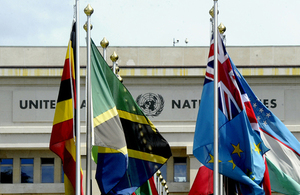UK national statement at the International Organization for Migration Council
This UK national statement at the International Organization for Migration Council was delivered on 29 November 2017.

The International Organization for Migration is headquartered in Geneva
Each year, we comment on what a busy year IOM has had, and each year the Organisation exceeds itself so that the definition of “busy” keeps changing. This year is no different and this is clearly demonstrated by the range of activity covered by your report, DG. It has also demonstrated once again that IOM are delivering in a range of places that many cannot even aspire to. We do not forget that IOM staffers are often working in difficult and dangerous places and we would like to take this opportunity to thank them for their hard work and dedication.
One of those places is of course Libya. Like many Libyans in-country, and many of the speakers here today, I share the disgust and grave concern at the news footage from last week. The UK welcomes the commitment by the Libyan Government of National Accord (GNA) to investigate the events shown on CNN and to bring those responsible to justice. We will continue to support the Libyan authorities to improve conditions in the centres currently under their control and to establish oversight of remaining ungoverned centres. This is a long term task but there are short term actions we can take collectively, as a matter of urgency, to assist those who find themselves unwittingly becoming the victims of this horrific trade. We welcome the DG’s update yesterday, committing IOM to increasing the rate of documentation and returns from the detention centre.
IOM is of course a key partner for the UK in humanitarian crises. If we want to tackle today’s humanitarian crises effectively, we urgently need a more effective system that can meet vulnerable people’s needs in a sustainable way. We need to shift from a reactive, short-term emergency model to one that is more proactive and long-term. The UK wishes to be a responsible donor that supports this vision and our commitment to high levels of multiyear and flexible funding is part of that. In return we will use our funding to create incentives for multilateral agencies to perform better and achieve collective improvements that will make a difference on the ground.
The UK has now agreed a Memorandum of Understanding and Performance Agreement with IOM, providing a total of £24 million of un-earmarked core funding to be dispersed over 4 years, giving IOM the flexibility to use it however it sees fit. For the first time, however, we are making 30% of all UN humanitarian agencies core funding contingent on achieving mutually agreed performance indicators, linked to both strengthening IOM as an organisation and supporting its role, working with other agencies, in reforming the humanitarian system.
IOM is the only agency in the UN system with a sole mandate for migration, which gives it a unique spread of expertise. The UK is proud to be one of the largest donors to the IOM, and IOM is a key partner for us across the full range of issues under its mandate, including in delivering operational projects in individual countries supporting the development of border management capability for safe, orderly and regular migration. We are therefore pleased to see increased reporting across the range of IOM activities, and support the continued focus on its full range of operational activity.
This year of course IOM has been busy working with the Special Representative of the Secretary General and with other members of the UN system on the Global Compact Safe, orderly and regular migration. We want to commend IOM for their work as the leading Agency for migration, providing expert technical and policy advice through the consultation phase, at the stocktaking in Mexico and as we move towards negotiation and adoption of the final Compact. We know that IOM will continue to support MS with the same level of expertise and professionalism beyond the adoption of the Compact.
Of course as IOM’s activities grow, difficult resource decisions have to be made. As we have mentioned before, we look forward to better understanding how this prioritisation is made, bearing in mind IOM’s non-normative, efficient and effective nature, through the Working group on budget reform as well as through the SCPF.
Finally, we would like to take this opportunity to thank the DG for his strong leadership of the Organization – you leave large shoes for your successor to fill, DG Swing! Our thanks to you and to the Administration who work so hard to deliver the outcomes and reforms we endorse.